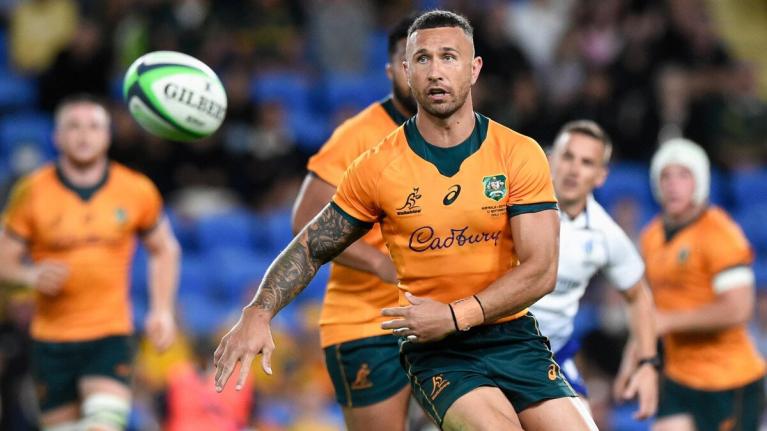Cooper set to become Australian citizen after win over Springboks

Wallabies playmaker Quade Cooper is finally set to become an Australian citizen following his match-winning heroics against the Springboks on Sunday.
Cooper completed a fairytale return to international rugby after a four-year hiatus as he guided the Wallabies to an upset win over the world champion Springboks on the Gold Coast two days ago.
It took an injury time penalty goal from Cooper, who knocked over 23 points from the kicking tee, to secure the 28-26 victory at Cbus Super Stadium as the Wallabies kept their faint Rugby Championship hopes alive.
In the wake of his stunning test rugby comeback, numerous calls were made on social media for Cooper to become an Australian citizen after it was revealed in July that he was denied citizenship by the Australian Government for the fourth time in six years.
The New Zealand-born first-five took to Twitter two months ago to share a letter he received from Australia's Department of Home Affairs that notified him of rejected application to attain an Australian passport.
As outlined by 'Shannon', an employee of the Department of Home Affairs who penned the letter, Cooper had not provided evidence that he is a “persons engaging in activities of benefit to Australia”, nor is he a “persons engaged in particular kinds of work requiring regular travel outside of Australia”.
This was in spite of the fact that Cooper, who was born in Auckland and raised in Tokoroa before moving to Brisbane as a 13-year-old, had, at the time, played 70 tests for the Wallabies and represented Australia at two World Cups.
Throughout his test career, the mercurial pivot had played, and continues to play, for the Wallabies while holding a New Zealand passport, which presented issues in his quest to represent Australia in rugby sevens at the 2016 Rio Olympics.
Under International Olympic Committee guidelines, players can only represent a country of which they hold citizenship in.
Cooper labelled his most recently rejected citizenship application as "awkward" and told ABC in July that he was "disheartened" by the result as reports suggested that successful applicants must have been based in Australia for the past four years.
Since 2019, Cooper has been based out of Japan as he has been playing club rugby for the Hanazono Kintetsu Liners, which had made him ineligible to be granted citizenship.
However, according to a report from the Sydney Morning Herald, it appears the 33-year-old could finally become an Australian citizen due to a change in immigration policy in light of his performance against the Springboks.
The Sydney Morning Herald reports that, after deputy Labor Senate leader Kristina Keneally reignited calls for Cooper to become an Australian citizen, Alex Hawke, the Minister for Immigration, is set to announce a slight tweak in policy to allow individuals in Cooper's position to be granted citizenship.
That tweak will allow individuals who meet all the requirements to become an Australian citizen except for the residency requirements because of travel for work to now be eligible for citizenship.
Cooper's bid to become an Australian citizen has been backed by federal government MP Jason Falinski, who revealed that Cooper's long-time halves partner and Kintetsu Liners teammate Will Genia has also been battling to gain citizenship.
Genia - who has played alongside Cooper for the Wallabies, Queensland Reds, Melbourne Rebels and now at the Kintetsu Liners since 2007 - was born in Papua New Guinea and moved to Brisbane at the age of 12.
“The unique work and travel demands on some of our most highly distinguished prospective Australians should not preclude them from making the cut,” Hawke said in a statement, via the Sydney Morning Herald.
“That’s why I have directed the Department of Home Affairs to apply greater flexibility in applying the residence requirement for eligible people.
“Exceptional people must not be prevented from becoming Australians because of the unique demands of the very work they do that makes them exceptional.”
Listen to the latest episode of the Aotearoa Rugby Pod below:
Latest Comments
Soccer on a rugby forum…
“Experience is strongly correlated with age, at least among the managers that I named”…
Slot and Arteta are among the youngest you named. They have the least experience as a manager (6 years each). Espírito Santo and Pep are the oldest and have the most (12 years + each). Pep is pushing 17 years experience, all at elite level. There are plenty around his age that won’t have the same level of experience. Plenty.
The younger breed you mentioned (Arteta in particular) may not coach at elite level beyond the next few years if they continue to not win trophies. Age and experience is not always a nice, steady gradient.
The only trend in English soccer is that managers don’t stay on as long with the same club. Due to the nature of the game and the assumed, immediate performance bounce of replacing them at the first sign of trouble. Knee-jerk style. Test rugby has no clear pattern of that.
Why would you dismiss a paradox? Contradictions are often revealing. Or is that too incoherent?
Go to commentsYou can’t compare the “quality”of competitions till they play against each other … what we do know is that nz teams filled with ABs and ABs can go at it with anyone in the world and these other teams and players are competing so would say the quality is high wouldn’t you? How are you determining that URC or top 14 is higher quality than Super I’m guessing you mean in the quality of players and execution ? Are you just assuming that it is because…. I would say it’s much of a muchness and the only indicator for that is international rugby and that is hella even
Go to comments